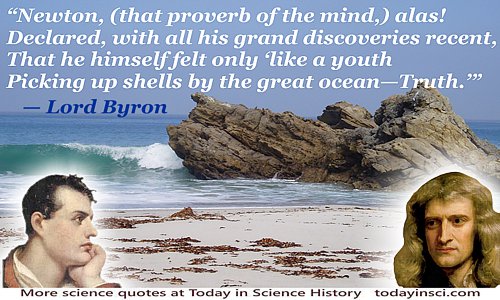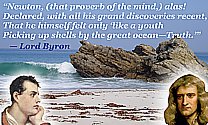 (source)
(source)
|
Lord George Gordon Byron
(22 Jan 1788 - 19 Apr 1824)
British romantic poet who is noted for his Romantic narrative poems. A daughter, Augusta Ada, was born during a brief marriage to Annabella Milbanke (1815) who left him the following year, because of an abusive relationship. Byron never saw them again. His daughter became renowned as Ada Lovelace, a mathematician credited with writing the world's first computer programme while associated with George Babbage.
|
Science Quotes by Lord George Gordon Byron (24 quotes)

Background of ocean and rocky outcrop with kelp on sandy shore in foreground, at Channel Islands NMS, California. , Photo by Claire Fackler, NOAA (source)
’Tis a pity learned virgins ever wed
With persons of no sort of education,
Or gentlemen, who, though well born and bred,
Grow tired of scientific conversation.
With persons of no sort of education,
Or gentlemen, who, though well born and bred,
Grow tired of scientific conversation.
— Lord George Gordon Byron
[My advice] will one day be found
With other relics of 'a former world,'
When this world shall be former, underground,
Thrown topsy-turvy, twisted, crisped, and curled,
Baked, fried or burnt, turned inside-out, or drowned,
Like all the worlds before, which have been hurled
First out of, and then back again to Chaos,
The Superstratum which will overlay us.
With other relics of 'a former world,'
When this world shall be former, underground,
Thrown topsy-turvy, twisted, crisped, and curled,
Baked, fried or burnt, turned inside-out, or drowned,
Like all the worlds before, which have been hurled
First out of, and then back again to Chaos,
The Superstratum which will overlay us.
— Lord George Gordon Byron
Don Juan (1821), Canto 9, Verse 37. In Jerome J. McGann (ed.), Lord Byron: The Complete Poetical Works (1986), Vol. 5, 420.
Bread has been made (indifferent) from potatoes;
And galvanism has set some corpses grinning,
But has not answer'd like the apparatus
Of the Humane Society's beginning,
By which men are unsuffocated gratis:
What wondrous new machines have late been spinning.
And galvanism has set some corpses grinning,
But has not answer'd like the apparatus
Of the Humane Society's beginning,
By which men are unsuffocated gratis:
What wondrous new machines have late been spinning.
— Lord George Gordon Byron
Don Juan (1819, 1858), Canto I, CXXX, 35. Aware of scientific experiments, the poet refers to the animating effects of electrical current on nerves of human corpses investigated by Professor Aldini (nephew of Galvani) on the body of Forster, a murderer (Jan-Feb 1803). Potato flour can be made by grinding dried grated potatoes.
I had a dream, which was not all a dream.
The bright sun was extinguish'd, and the stars
Did wander darkling in the eternal space,
Rayless, and pathless, and the icy earth
Swung blind and blackening in the moonless air;
Morn came, and went—and came, and brought no day.
The bright sun was extinguish'd, and the stars
Did wander darkling in the eternal space,
Rayless, and pathless, and the icy earth
Swung blind and blackening in the moonless air;
Morn came, and went—and came, and brought no day.
— Lord George Gordon Byron
Darkness (1816), lines 1-6. In Jerome J. McGann (ed.), Lord Byron: The Complete Poetical Works (1986), Vol. 4, 40-1.
I love not Man the less, but Nature more.
— Lord George Gordon Byron
In 'Childe Harold’s Pilgrimage' (1818), The Complete Works of Lord Byron: Reprinted from the Last London Edition (1841), Canto IV, CLXXVIII, 146.
In her starry shade
Of dim and solitary loveliness,
I learn the language of another world.
Of dim and solitary loveliness,
I learn the language of another world.
— Lord George Gordon Byron
Knowledge is not happiness, and science
But an exchange of ignorance for that
Which is another kind of ignorance.
But an exchange of ignorance for that
Which is another kind of ignorance.
— Lord George Gordon Byron
Manfred (1816), Act 2, Scene 4. In George Gordon Byron and Thomas Moore, The Works of Lord Byron (1837), 333.
Let not a monument give you or me hopes,
Since not a pinch of dust remains of Cheops.
Since not a pinch of dust remains of Cheops.
— Lord George Gordon Byron
Nothing, save the waves and I.
— Lord George Gordon Byron
George Gordon Byron and Paul Elmer More, 'Don Juan', The Complete Poetical Works of Lord Byron (1905), 813.
O! what a noble heart was here undone,
When Science’s self destroyed her favorite son.
When Science’s self destroyed her favorite son.
— Lord George Gordon Byron
Tributary verse eulogizing Henry Kirk White, whose death was attributed to fatigue caused by his long research work.
Philosophy, and science, and the springs
Of wonder, and th wisdom of the world,
I have essayed; and in my mind there is
A power to make these subject to itself...
Of wonder, and th wisdom of the world,
I have essayed; and in my mind there is
A power to make these subject to itself...
— Lord George Gordon Byron
From poem 'Manfred'.
Roll on, thou deep and dark blue ocean—roll!
— Lord George Gordon Byron
In 'Childe Harold’s Pilgrimage', The Complete Works of Lord Byron: Reprinted from the Last London Edition (1841), CLXXIX, 146.
Science is but the exchange of ignorance for that which is another kind of ignorance.
— Lord George Gordon Byron
…...
Society itself, which should create Kindness, destroys what little we had got:
To feel for none is the true social art
Of the world’s stoics—men without a heart.
To feel for none is the true social art
Of the world’s stoics—men without a heart.
— Lord George Gordon Byron
Socrates said, our only knowledge was
“To know that nothing could be known;” a pleasant
Science enough, which levels to an ass
Each Man of Wisdom, future, past, or present.
Newton, (that Proverb of the Mind,) alas!
Declared, with all his grand discoveries recent,
That he himself felt only “like a youth
Picking up shells by the great Ocean—Truth.”
“To know that nothing could be known;” a pleasant
Science enough, which levels to an ass
Each Man of Wisdom, future, past, or present.
Newton, (that Proverb of the Mind,) alas!
Declared, with all his grand discoveries recent,
That he himself felt only “like a youth
Picking up shells by the great Ocean—Truth.”
— Lord George Gordon Byron
From poem, 'Don Juan,' (1822), canto 7, verse V. In Lord Byron, Don Juan: Cantos VI, VII and VIII (1823), 67.
The great art of life is sensation, to feel that we exist, even in pain.
— Lord George Gordon Byron
…...
The starry Galileo, with his woes.
— Lord George Gordon Byron
This is the patent-age of new inventions
For killing bodies, and for saving souls,
All propagated with the best intentions;
Sir Humphrey Davy's lantern, by which coals
Are safely mined for in the mode he mentions,
Tombuctoo travels, voyages to the Poles,
Are ways to benefit mankind, as true,
Perhaps, as shooting them at Waterloo.
For killing bodies, and for saving souls,
All propagated with the best intentions;
Sir Humphrey Davy's lantern, by which coals
Are safely mined for in the mode he mentions,
Tombuctoo travels, voyages to the Poles,
Are ways to benefit mankind, as true,
Perhaps, as shooting them at Waterloo.
— Lord George Gordon Byron
Don Juan (1819, 1858), Canto I, CXXXII, 36. Although aware of scientific inventions, the poet seemed to view them with suspicion. Davy invented his safety lamp in 1803. Sir W.E. Parry made a voyage to the Arctic Regions (4 Apr to 18 Nov 1818).
This is the way physicians mend or end us
Secundum artem; but although we sneer
In health-when ill, we call them to attend us,
Without the least propensity to jeer;
While that hiatus maxime deplendus
To be fill’d by spade or mattock, ‘s nea
Secundum artem; but although we sneer
In health-when ill, we call them to attend us,
Without the least propensity to jeer;
While that hiatus maxime deplendus
To be fill’d by spade or mattock, ‘s nea
— Lord George Gordon Byron
…...
To be perfectly original one should think much and read little, and this is impossible, for one must have read before one has learnt to think.
— Lord George Gordon Byron
In Select Works of Lord Byron (1834), Vol. 6, 512.
Unchangeable, save to thy wild waves play.
— Lord George Gordon Byron
In 'Childe Harold’s Pilgrimage', The Complete Works of Lord Byron: Reprinted from the Last London Edition (1841), CLXXXII, 146.
What opposite discoveries we have seen!
(Signs of true genius, and of empty pockets.)
One makes new noses, one a guillotine,
One breaks your bones, one sets them in their sockets;
But vaccination certainly has been
A kind antithesis to Congreve's rockets, ...
(Signs of true genius, and of empty pockets.)
One makes new noses, one a guillotine,
One breaks your bones, one sets them in their sockets;
But vaccination certainly has been
A kind antithesis to Congreve's rockets, ...
— Lord George Gordon Byron
Don Juan (1819, 1858), Canto I, CCXXIX, 35. Referring to Edward Jenner's work on vaccination (started 14 May 1796), later applied by Napoleon who caused his soldiers to be vaccinated. Sir William Congreve's shells, invented in 1804, proved very effective at the battle of Leipzig (1813).
When Newton saw an apple fall, he found
In that slight startle from his contemplation—
'Tis said (for I'll not answer above ground
For any sage's creed or calculation)—
A mode of proving that the earth turn'd round
In a most natural whirl, called 'gravitation';
And this is the sole mortal who could grapple,
Since Adam, with a fall, or with an apple.
In that slight startle from his contemplation—
'Tis said (for I'll not answer above ground
For any sage's creed or calculation)—
A mode of proving that the earth turn'd round
In a most natural whirl, called 'gravitation';
And this is the sole mortal who could grapple,
Since Adam, with a fall, or with an apple.
— Lord George Gordon Byron
Don Juan (1821), Canto 10, Verse I. In Jerome J. McGann (ed.), Lord Byron: The Complete Poetical Works (1986), Vol. 5, 437.
While stands the Coliseum, Rome shall stand;
When falls the Coliseum, Rome shall fall;
And when Rome falls—the world.
When falls the Coliseum, Rome shall fall;
And when Rome falls—the world.
— Lord George Gordon Byron
Quotes by others about Lord George Gordon Byron (4)
Is not Cuvier the great poet of our era? Byron has given admirable expression to certain moral conflicts, but our immortal naturalist has reconstructed past worlds from a few bleached bones; has rebuilt cities, like Cadmus, with monsters’ teeth; has animated forests with all the secrets of zoology gleaned from a piece of coal; has discovered a giant population from the footprints of a mammoth.
From 'La Peau de Chagrin' (1831). As translated by Ellen Marriage in The Wild Ass’s Skin (1906), 21-22.
Certainly Lord Byron has expressed in words some aspects of spiritual turmoil; but our immortal natural historian has reconstructed worlds from bleached bones.
From 'La Peau de Chagrin' (1831). As translated as The Wild Ass’s Skin (1906) trans. Herbert J. Hunt, The Wild Ass’s Skin (1977), 40-1.
Is not Cuvier the greatest poet of our age? Of course Lord Byron has set down in fine words certain of our souls’ longings; but our immortal naturalist has reconstructed whole worlds out of bleached bones. Like Cadmus, he has rebuilt great cities from teeth, repopulated thousands of forests with all the mysteries of zoology from a few pieces of coal, discovered races of giants in the foot of a mammoth.
From 'La Peau de Chagrin' (1831). As translated as by Helen Constantine The Wild Ass’s Skin (2012), 19.
Neither the absolute nor the relative size of the brain can be used to measure the degree of mental ability in animal or in man. So far as man is concerned, the weights of the brains or the volumes of the cranial cavities of a hundred celebrities of all branches of knowledge all over the world have been listed. … At the bottom of those lists are Gall, the famous phrenologist, Anatole France, the French novelist, and Gambetta, the French statesman, each with about 1,100 cc brain mass. The lists are topped by Dean Jonathan Swift, the English writer, Lord Byron, the English poet, and Turgenev, the Russian novelist, all with about 2,000 cc … Now our mental test! Had Turgenev really twice the mental ability of Anatole France?
In 'The Human Brain in the Light of Its Phylogenetic Development', Scientific Monthly (Aug 1948), 67, No. 2, 104-105. Collected in Sherwood Larned Washburn and Davida Wolffson (eds.), The Shorter Anthropological Papers of Franz Weidenreich Published in the Period 1939-1948: A Memorial Volume (1949), 18.
See also:
- Lord Byron - On Newton's “Playing on the Seashore” illustrated quote - Pebble Background - Medium 500px.
- Lord Byron - On Newton's “Playing on the Seashore” illustrated quote - Pebble Background - Large 800px.
- Lord Byron - On Newton's “Playing on the Seashore” illustrated quote - Ocean Background - Medium 500px.
- Lord Byron - On Newton's “Playing on the Seashore” illustrated quote - Ocean Background - Large 800px.

 In science it often happens that scientists say, 'You know that's a really good argument; my position is mistaken,' and then they would actually change their minds and you never hear that old view from them again. They really do it. It doesn't happen as often as it should, because scientists are human and change is sometimes painful. But it happens every day. I cannot recall the last time something like that happened in politics or religion.
(1987) --
In science it often happens that scientists say, 'You know that's a really good argument; my position is mistaken,' and then they would actually change their minds and you never hear that old view from them again. They really do it. It doesn't happen as often as it should, because scientists are human and change is sometimes painful. But it happens every day. I cannot recall the last time something like that happened in politics or religion.
(1987) -- 


